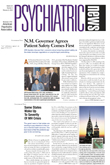Funding for autism-related activities at the Centers for Disease Control and Prevention (CDC) is expected to increase significantly in the next year, now that the House of Representatives has approved a conference report containing the Fiscal 2004 appropriations for the Department of Health and Human Services (HHS) and several other federal departments. HHS oversees the CDC and the National Institutes of Health, among other national health-related agencies.
The HHS measure is expected to remain unchanged when the Senate votes on the conference report this month, according to APA’s Division of Government Relations.
The House conference report, which is a compromise between seven House and Senate Fiscal 2004 appropriations bills, allocates $5.2 million to the CDC to expand its autism-related activities. This is $3 million above what Congress approved for this purpose last fiscal year.
The congressional conferees designated $3 million of the total amount for the CDC to expand its capacity to identify diagnosed cases of autism so that it can monitor any changes in incidence of the disorder.
The remaining $2.2 million is for the CDC to establish a national education program to help families recognize and health care professionals diagnose autism, according to the conference report. A provision states that the CDC must administer and pilot the program in partnership with voluntary, nonprofit autism organizations.
The Autism Society of America (ASA) has been working closely with members of Congress and the CDC to expand monitoring of autism cases, raise awareness of the importance of early diagnosis of the disorder, and support autism research, ASA President Rob Beck said at a national summit on autism in November 2003 (
see story on page 27).
Beck announced that the ASA has partnered with the National Center on Birth Defects and Developmental Disabilities at the CDC and with the American Academy of Pediatrics to develop an early screening and protection program focused on autism.
The program’s goal is to screen children early so they can begin treatment. “Most children are not diagnosed with autism disorders until [they are of] school age, and years of treatment have been lost,” said Beck.
The new national program will focus first on educating parents about how to recognize autism and other potential disabilities. Approximately 40 percent of people diagnosed with autism have another disability, Beck noted.
Pediatricians and their staffs will be educated about best diagnostic practices, because many have indicated that they feel unprepared to assess a child’s developmental status, said Beck.
Information about the national autism education and screening program is posted on the ASA Web site at www.autism-society.org/site/PageServer. ▪
